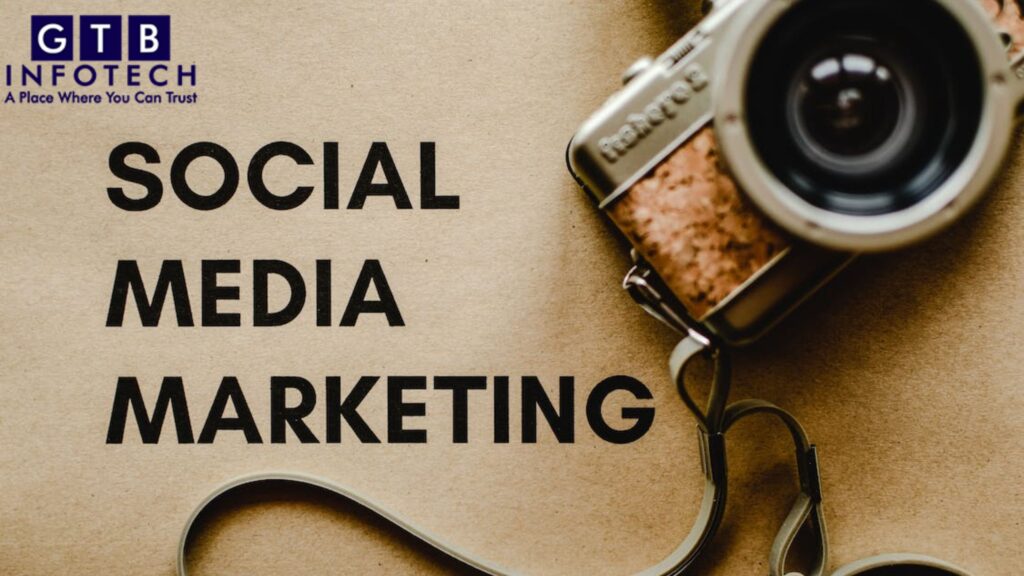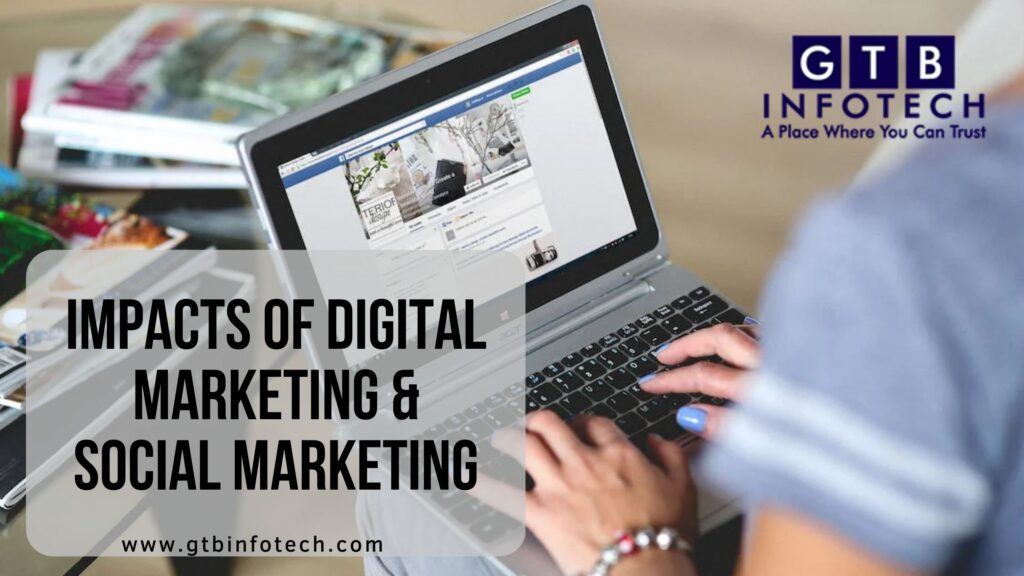In this blog, we will discuss the impact of Digital Marketing Vs Social Media Marketing strategies and would know which would work better for your business.

What is Digital Marketing & Social Media Marketing?
Digital Marketing
This can be termed as a marketing strategy that is used to promote a product and develop an influential relationship with the customers via all digital and offline sources. It is creating awareness about the product using digital channels.
The digital channel uses the internet and the methods which are used by digital marketing are SEO, SEM, E-commerce, and Email marketing. Offline sources utilize radio, SMS, and television for marketing. When we are using this strategy there are three different components which are Mobile marketing, Online marketing, and Social media marketing. This also focuses on the public’s likes as to what is trending and how it is to be delivered to the consumer.
Social Media Marketing
This can be termed as a marketing strategy that is used to promote a product and develop an influential relationship with customers via different Social Media platforms. Social media is a platform where users come and share content such as messages, videos, etc.
But this is more than it seems, social media marketing helps to establish a relationship with the customer and make the presence of marketers on the web. Three modes primarily Blogs, social networks, and forums are used for this.
The ways in which you can get Social media marketing can be achieved are to start making a connection with the community and then sharing valuable content with them. The next way for advertisements on social media is known as sponsor ads.

The Pros and Cons
Pros of Digital Marketing
Digital marketing gives you the chance to target a certain audience, create material just for them, and monitor their activity. Digital marketing also gives you the chance to reach a larger audience and is significantly cheaper than traditional marketing.
Cons of Digital Marketing
The disadvantages of digital marketing, meantime, include the possibility of significant implementation costs and the challenge of reaching specific customer categories. Likewise, it’s simple to ignore customer experience and brand identity in favor of the finer points of statistics and tactics.
The advent of digital media and the proliferation of social media has revolutionized the marketing industry. It is now imperative for businesses to incorporate both digital marketing and social media marketing in their overall marketing strategy. Each has particular advantages and disadvantages that should be thoroughly considered before choosing one over the other.
Pros of Social Media Marketing
Social media marketing has two advantages: increased visibility among potential customers and improved customer engagement. You can quickly reach a large audience, build customer relationships, and generate leads. Social media campaigns can also be very inexpensive and provide real-time insights into customer preferences.
Cons of Social Media Marketing
Social media marketing has some drawbacks as well. Negative comments or complaints can quickly spread and harm your brand. Furthermore, managing social media can be time-consuming, and you may not see immediate results. To ensure the effectiveness of your social media campaigns, set goals and track progress.
Finally, it is critical to carefully weigh the benefits and drawbacks of both digital marketing and social media marketing to determine which is the best fit for your company. You can use both effectively to create a successful marketing plan with careful management and strategic planning.
Difference Between the two types of Marketing?
Digital and social media marketing are two distinct marketing approaches that have become increasingly intertwined in recent years. Digital marketing is the use of digital channels to promote products, services, and brands. Social media marketing is the use of social media platforms to engage with customers, build relationships, and promote products or services.
How Digital Marketing is different from Social Media Marketing?
| Sno. | Digital Marketing |
|---|---|
| 1. | To promote products to customers, digital marketing employs both online and offline channels. |
| 2. | This results in a broad reach in front of customers. |
| 3. | Banners are used to create a product impression. |
| 4. | It makes use of every component. |
| 5. | The results are relatively slow. |
| 6. | SMS, E-mail, Television, and other platforms are used. |
| 7. | It reaches the intended audience when they visit the websites, any associated social media accounts, email, and other digital platforms. |
| 8. | The use of banner advertisements on various digital platforms is critical to the success of digital marketing. For example, television, the Internet, and billboards can all be used to promote your brand. |
| 9. | It is concerned with users who use various digital platforms. |
| 10. | It takes time to develop a strategy that works across multiple platforms. |
| 11. | It raises brand awareness to increase website traffic and assesses the effectiveness of content, social media, and media. |
How Social Media Marketing is different from Digital Marketing?
| Sno. | Social Media Marketing |
|---|---|
| 1. | Social media marketing makes use of social media platforms to raise product awareness. |
| 2. | This results in a limited customer reach. |
| 3. | The most important aspect of this is the content. |
| 4. | It is a part of Digital Marketing. |
| 5. | The likes of the customer influence the outcome. |
| 6. | Instagram, Facebook, Twitter, and other social media platforms are used. |
| 7. | To target the audience, only social media platforms are used. |
| 8. | The success of social media marketing is dependent on posting new and unique content on social media accounts on a regular basis in order to engage your target audience. |
| 9. | It is focused on social media users. |
| 10. | Strategy planning that is immediately effective can be carried out. |
| 11. | It emphasises audience interaction through social media platforms and also tracks customer engagement. |
While there are some similarities in terms of strategies and tactics between digital and social media marketing, there are also significant differences. Digital marketing campaigns such as search engine optimization (SEO), pay-per-click (PPC) advertising, display ads, and so on are being used to drive web traffic. While social media marketing focuses on developing customer relationships through content creation, engagement activities such as contests or polls, influencer collaborations, and other means.
How to Leverage Both for Maximum Impact
Businesses can use digital and social media to reach their target audience. Leveraging both digital and social media can help businesses maximize their impact and reach a larger audience. Digital media enables businesses to create content that is tailored to the needs of their target audience, whereas social media allows them to engage with customers on a more personal level.
Companies can create meaningful connections with their customers, build trust, and drive sales by utilizing both digital and social media. Companies should also use analytics to measure the success of their campaigns, allowing them to make data-driven decisions about how to best leverage digital and social media for maximum impact.
Conclusion:

How to Choose Between Digital & Social Media for Your Business
Choosing the best digital and social media platforms for your company is a critical decision. It has the potential to make or break your online success. With so many options available, deciding which ones are best for you can be difficult. Consider the following factors to ensure you make the best decision: your target audience, budget, content type, and objectives. You will be able to select the best digital and social media platforms for your business if you understand these factors and use them to guide your decision-making process.
For more details, you can visit our website www.gtbinfotech.com
or contact us on Facebook and LinkedIn